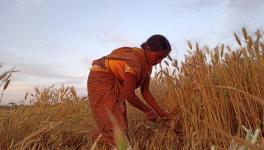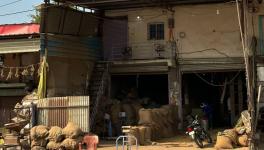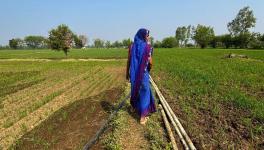Kerala Budget 2021 Hikes MSP to Help Struggling Rubber Farmers; Centre’s Intervention Needed for Better Prices
As the farmers across the country are on the streets struggling for their livelihood, the Kerala government, through its 2021 Budget has once again lit farmers' hopes. State Finance Minister Dr Thomas Isaac, on January 15, presented the final budget of the Left Democratic Front (LDF), hiking the Minimum Support Price (MSP) for rubber to Rs 170, paddy to Rs 28 and coconut to Rs 31 per kilogram. Earlier, the state government had declared MSPs for 16 crops including vegetables and fruits.
Increasing the support price of rubber to Rs 170 per kg from Rs150 is expected to provide some relief to farmers, especially small and marginal ones, who have been reeling under high cost of production. The hike in support price will be effective from April 1 this year.
In the 2021 budget, it is also promised that the Kerala Rubber Limited will be established with 26% of government share for setting up a hub for rubber-based industries including tires. The anticipated capital investment for Kerala Rubber Limited is Rs.1,050 crore. A co-operative organisation on the lines of Amul will procure rubber for this company. The headquarters of this company will be in the surplus land of Velloor News Print Factory, for which the state government had sanctioned Rs.250 crore for its takeover.
Kerala is the largest rubber producer across the country followed by Tripura. Over 7 lakh rubber growers are there in Kerala, and of this, the majority are small and marginal growers. In Kerala, Kottayam district is the leader in rubber production, where about 15% of the total industrial units is involved in it. Meenachil and Kanjirappilly talukas are also known as the hubs of the best rubber plantations in the state.
“The rubber farmers in Kerala have been struggling and recent years have seen a drastic decline in rubber prices. But, when rubber prices had dropped, prices of the produce from rubber including the tire did not decreased. Then where is this money gone? Only farmers have to suffer," said KN Balagopal, state secretary of Kerala Karshaka Sangham, the state chapter of All India Kisan Sabha, while talking to NewsClick.
According to the Rubber Board statistics, RSS4 grade rubber's price has fallen from a high of Rs 20,805 a quintal in 2011-12 to Rs 12,595 a quintal in 2018-19. In between, it had dropped to a low of Rs 11,306 in 2015-16. As per the Kochi market, RSS4 grade rubber's price as of January 18, 2021, is Rs 15,300 per quintal.
Also, only 4.88 lakh hectares of the total 6.64 lakh hectares of rubber have been tapped this fiscal year. Due to various reasons, including the increase in production cost and decrease in prices, the remaining 1.76 lakh hectares of rubber is lying untapped.
Few small and marginal rubber farmers from Thamarassery Taluk in Kozhikode district, whom NewsClick spoke to, have also pointed out that their plantations remained untapped this year. "Though this year has seen a slight increase in the price of rubber compared to previous years, it has been showing an increasing trend. The cost of production has, however, increased. Also, there is a lack of skilled tappers as well," said one of the farmers, who grows rubber in one and a half acres of his land.
This group of farmers see the increase in base price as a relief. "If we have been assured Rs 170 per kilogram, it is a huge relief for us. In previous years, we had to sell rubber below Rs 110 per kilogram in the market," said a small-scale farmer.
The condition of tappers, the labourers who tap the rubber trees, is no different. As rubber prices have been stagnant, the wages of tappers have not been hiked for a long time. The wages of tappers is determined by the number of trees they tap per day.
Quoting the State Planning Board's report, R.Harikumar, president of Cochin Chamber of Commerce and Industry, said, "the impact of the lockdown had projected major losses for the agriculture and plantation sector with an estimated loss of Rs 650 crore to rubber plantations wherein workers (mainly tappers) lost around Rs 110 crore. The decision to increase the base price would definitely be a major relief for the farmers."
Terming the Kerala Rubber Park as a good initiative, George Valy, President of the Kottayam Rubber Dealers Federation, said that this would increase rubber production to cater to the demand of the industry. He said the government should also come out with a scheme for replanting senile plants by extending finance at lower interest rates.
However, the rubber growers demand that the minimum support price should be at least Rs 250 per kilogram. In 2016, the Rubber Board declared that the production cost of a kilo of rubber was Rs 172. If we consider production cost plus 50% of production cost, the minimum support price should be at least Rs 258 per kilogram of rubber, the farmers said.
When talking about rubber's price drop, one cannot neglect the ASEAN-India free trade agreement and how it derailed India's balance of trade in rubber and rubber products. Cheap imports from other countries have affected the local farmers. The trade agreement with ASEAN countries saw the state's rubber production slip from an annual 10 lakh tonnes to six lakh tonnes.
Also, the Kerala farmers had been getting around Rs 245 per kilogram of rubber before the treaty. It came down to Rs 110 per kilogram after India started importing rubber from other countries like Indonesia and Malaysia.
Taking a stand on uncontrolled import of produces, the state government, however, in its budget has urged the central government to protect cash crops including rubber, Arecanut, pepper, cardamom, tea etc. The state strongly demanded the central government to protect these crops by ensuring support price, and central assistance, which is essential for enhancing the support price of rubber from Rs.170 to Rs.200.
Get the latest reports & analysis with people's perspective on Protests, movements & deep analytical videos, discussions of the current affairs in your Telegram app. Subscribe to NewsClick's Telegram channel & get Real-Time updates on stories, as they get published on our website.
























